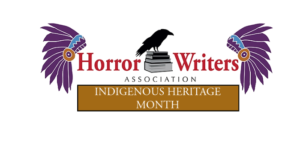

Stephen Graham Jones is the NYT bestselling author of some thirty novels and collections, and there’s some novellas and comic books in there as well. Most recent are Don’t Fear the Reaper and the ongoing Earthdivers. Up before too long are The Angel of Indian Lake and I Was a Teenage Slasher. Stephen lives and teaches in Boulder, Colorado.
What inspired you to start writing?
I’ve been a storyteller ever since the first time I spilled kool-aid on the couch and had to explain to mom how my little brother had maliciously done this, and was probably setting me up to take the fall, and if we let this continue, he might grow up to be an evil genius and pour baking soda and hydrogen peroxide into a dormant volcano and blow up the world, so, all things considered—especially my obvious innocence—it was probably best to let me skate, so far as this stain was concerned. As for what inspired me to start writing at nineteen, it was probably this guy in an ICU bed I kept watching wake up and pull all his cable and lines out, trying to fight to get back to his son.
What was it about the horror genre that drew you to it?
The stakes are high and operatic, and that makes my heart beat. I like that horror is one of two genres—the other being romance/erotica (I know there’s a line there, but it’s hazy, and the lights are all dialed down in this genre anyway, it’s hard to see it)—that can elicit a visceral response.
Do you make a conscious effort to include indigenous characters and themes in your writing and if so, what do you want to portray?
Don’t have to. The base, default setting for me is “Native.” Anything else feels like a deviation, where I have to start being careful not to overstep, assume things I got no right to be assuming, much less writing.
What has writing horror taught you about the world and yourself?
That the dark is populated. And that I can be digested.
How have you seen the horror genre change over the years? And how do you think it will continue to evolve?
More chances are being taken, yeah. Formal chances, I mean. There’s weird stuff happening, and that’s the garage-band DNA any genre needs to stay vital. I don’t know what the next evolution of horror might be, but I hope to be here for it, anyway, as a reader, maybe a writer, if I can keep up.
How do you feel the indigenous community has been represented thus far in the genre and what hopes do you have for representation in the genre going forward?
Guess my big hope is that we stop being coin-drop characters—the person the main crew shuffles up because of our hair, our skin color, our name, our tribal designation, whatever, and, essentially, drops a quarter in our mouth so we can recount some “ancient” story associated with this place, this current evilness. After which that coin-drop character fades back into the background. Which is just where America likes us. I mean, it’s where it likes us to be if it can’t completely erase us, and till us into the soil, and overwrite our image, our culture, while using our names for everything, as if that makes it all right.
Who are some indigenous horror authors you recommend our audience check out?
Owl Goingback. Erika Wurth. Theo Van Alst. Shane Hawk. Andrea Rogers. Waubgeshig Rice. Man, there’s so many more of us, too, in horror and in all the other genres. I’m already wincing from the names I’m forgetting. But, in short? We don’t all write about hawks being symbolic in the sky, and we don’t speak in Red English. But we do have certain feelings about how our word processors always capitalize “america.”
What is one piece of advice you would give horror authors today?
Write about what scares you, not about what’s generally scary, or what’s hot right now. Get your nightmares down on the page in the way only you can, and then they have a chance to infect the sleep of everyone else.
And to the indigenous writers out there who are just getting started, what advice would you give them?
https://journals.kent.ac.uk/index.php/transmotion/article/view/266/900

